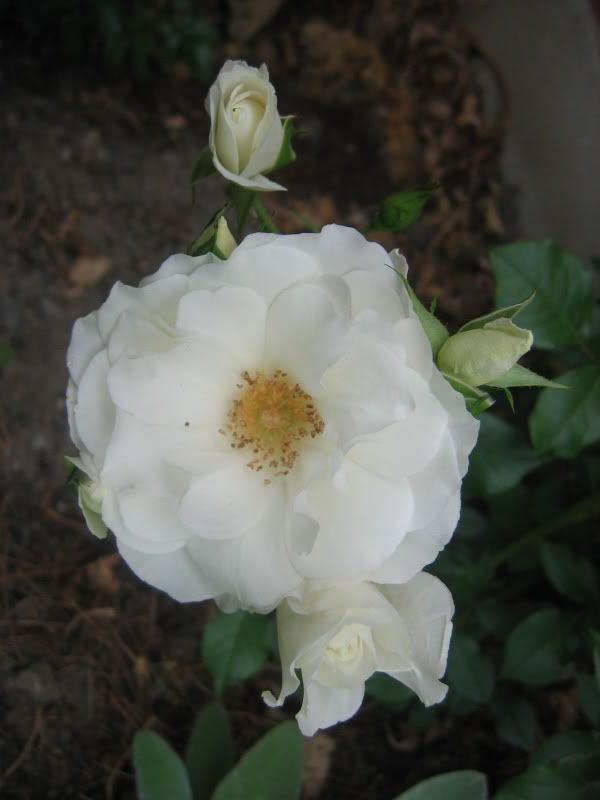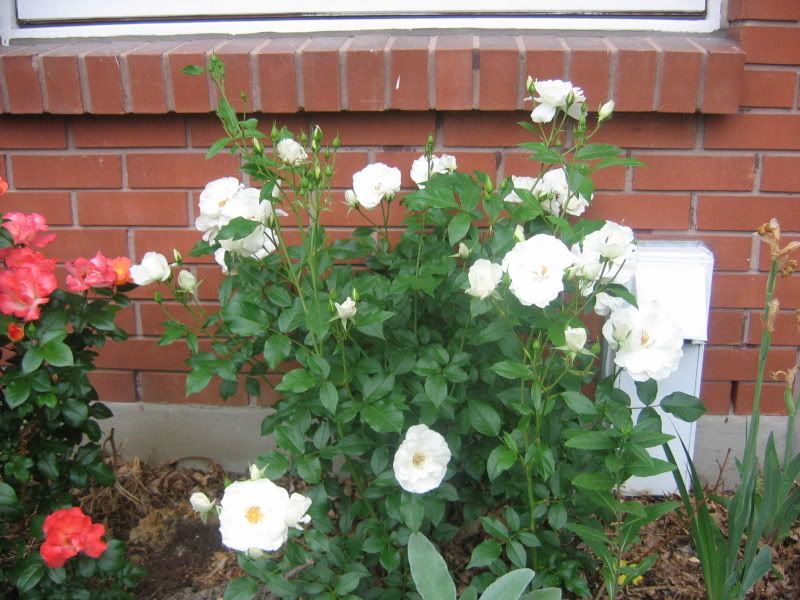The beautiful Iceberg rose
 This Iceberg is melting... me. Wonderful winter-hardiness; recurring flushes of brilliant white, delicately fragrant blooms that hold up for many days even in summer heat; glossy, disease-resistant foliage; what's not to love? It's not for nothing that Iceberg was inducted into the World Federation of Rose Societies' Hall of Fame in 1983. It is essentially the gold standard of white floribunda roses (and climbing roses, because there's a climbing version, too).
This Iceberg is melting... me. Wonderful winter-hardiness; recurring flushes of brilliant white, delicately fragrant blooms that hold up for many days even in summer heat; glossy, disease-resistant foliage; what's not to love? It's not for nothing that Iceberg was inducted into the World Federation of Rose Societies' Hall of Fame in 1983. It is essentially the gold standard of white floribunda roses (and climbing roses, because there's a climbing version, too). This is therefore an excellent rose for people who don't like to fuss over persnickety plants, or who simply don't have the time to. Those who get a great deal of pleasure out of growing things their neighbours can't are advised to look elsewhere. I do water it thoroughly once a week, because it's in the rain shadow of our eaves and I did pile up potting soil around its base for some winter protection. Most of the canes that were exposed to the air all winter came back without the slightest hesitation anyway. Granted, it was a mild winter. That, and a light pruning in the early spring was all the special attention it got. A little top-dressing with aged sheep manure was applied to the entire bed, so it got that too. And that's it.
This is therefore an excellent rose for people who don't like to fuss over persnickety plants, or who simply don't have the time to. Those who get a great deal of pleasure out of growing things their neighbours can't are advised to look elsewhere. I do water it thoroughly once a week, because it's in the rain shadow of our eaves and I did pile up potting soil around its base for some winter protection. Most of the canes that were exposed to the air all winter came back without the slightest hesitation anyway. Granted, it was a mild winter. That, and a light pruning in the early spring was all the special attention it got. A little top-dressing with aged sheep manure was applied to the entire bed, so it got that too. And that's it.
My biggest complaint about Iceberg is that the white is so pure, that it can be difficult to catch with a camera. It simply reflects too much light back to the lens. I wouldn't even attempt it on a sunny day.


7 comments:
Welcome to Garden Web!I am there too.Yes our roses have taken centre stage in our gardens move over peonies! I posted my heavenly Queen Elizabeth rose the other day!!
Janet, your photo looks wonderful. I have had Schneewittchen also some years ago, but they always lost the leaves and has blackspot.
Sigrun
Naturegirl,
And I checked it out, too! :o)
Sigrun,
Vielen Dank! Do try the Iceberg instead of Schneewittchen. I think you'll find it much easier. You can try spraying with a baking soda solution instead, if you prefer. Do it weekly and after rains before you start having problems. (I'm going to have to dust off my German...)
Sigrun probably WAS growing the rose we English speakers know as the floribunda 'Iceberg'. Hybridized by Kordes in Germany (1958), the official name is Schneewittchen. Unfortunately, there's a much older rose (a polyantha) that carries the same name. I've often wondered why Iceberg has such universal acclaim. My experience was like Sigrun's.
Thanks so much for the clarification! It almost makes me wonder if you really got Iceberg. It's happened to me more than once that the name on the label and the plant I actually got were two different things. Or maybe it's a question of climate. Someday, when I know everything, I'll explain it all... ;o)
Great image. I love roses and have 11 different roses in the front garden, but I've come to realise that desease resistant is a label that should not be applied to roses. In Devon it does not matter what the rose is, it will get black spot or rust or mildew or even a combination :D
Anyone would think I have shares in systemic fungicides. Does anyone have this problem?
I'm currently updating my website, which shows various plants in the front and rear courtyard garden.
Visit Anje Yelf's website.
Anje, sounds like a baking soda spray at regular intervals would be helpful for you then. Mine is looking a little less wonderful because I've been neglecting it this year. Next year that entire bed will be moved forward and my life will be much easier. There will be access from the back and my roses will be directly exposed to rain. Maybe then I'll be looking at some blackspot, but I haven't had that problem yet. I hope I don't: I'm bad at regular upkeep...
Post a Comment